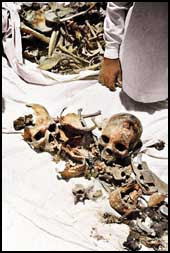The murder of Egyptian POWs at Ras Sedr in 1967
Now tell me you've never had this problem: your unit wins its first battle, and captures a few dozen prisoners. But you have more things to do, and those POWs will just slow everything down. What do you do? What DO you do?
In June 2000, the Egyptian newspaper Al-Wafd reported that the remains of 52 Egyptian soldiers, and some personal effects (a wristwatch, a wedding ring, and a letter sent from one of the soldiers to his family, dated May 1967) were found in a grave in the south Sinai holiday resort of Ras Sedr. Some bodies were identifiable through identity cards found in the pockets of their uniforms, and there were bullet holes in the skulls, indicating execution-style murder.
What happened? Richard Silverstein recounts:
Paratroopers were dropped by helicopter into Ras Sudr, where they met a unit of Egyptian troops which surrendered almost immediately. According to various accounts, there were between 50-70 troops captured. They were bound, gagged, masked and marched into an enclosed area, where they were held in the burning sun for hours.
The prisoners begged for water, which their Israeli jailers provided from their own canteens. There were also conversations between the Israelis and Egyptians about their respective army lives and routines.
Since the Israeli battle plan was to move quickly, capture targets and then move on to new assignments, the paratroop unit received orders to move on. But what were they to do with the prisoners? They were paratroopers, after all. They'd dropped onto Ras Sudr from helicopters.
They couldn't move them or take them with them. The commander who'd ordered them to move out, according to different sources, either directed them to kill the prisoners or told them merely to "solve the problem". At any rate, the Israeli army soldiers, under a junior officer, then lined the men up and executed them.
After completing the killings, an armoured relief unit arrived on the scene with bulldozer. It dug a grave and buried the bodies in it.Silverstein recounts that the junior officer who did the killing was sentenced to three years, but was released after 7 months. About 4 days imprisonment per murder. As we will see, it's surprising he was disciplined at all.
One more interesting speculation: the USS Liberty was off the Sinai coast, doing signals intelligence. Could they, as James Bamford suggests, have picked up Israeli communications about this massacre and others, admitted by Arieh Biroh, the general in charge? Could that be why they were attacked by the Israeli Air Force?
And for your collection of Israeli lies. Michael Oren, Israeli ambassador to the United States, claimed after this discovery and others, that
Egypt has ruled the Sinai for over 20 years, yet it has never uncovered any mass grave.




Comments
Post a Comment